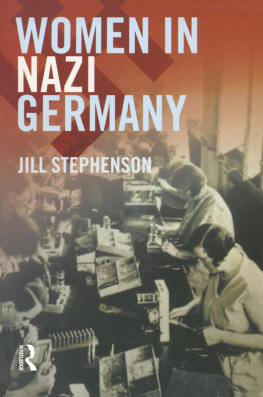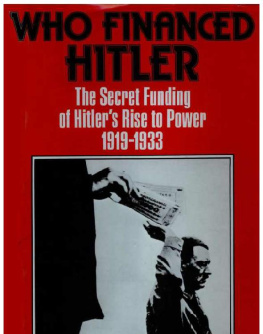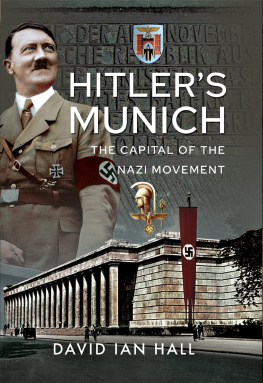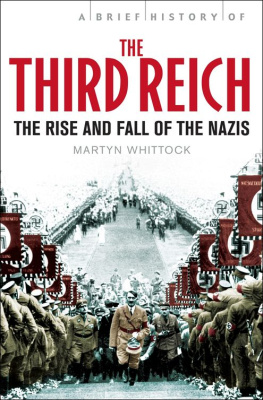Thank you for buying this ebook, published by NYU Press.
Sign up for our e-newsletters to receive information about forthcoming books, special discounts, and more!
Sign Up!
About NYU Press
A publisher of original scholarship since its founding in 1916, New York University Press Produces more than 100 new books each year, with a backlist of 3,000 titles in print. Working across the humanities and social sciences, NYU Press has award-winning lists in sociology, law, cultural and American studies, religion, American history, anthropology, politics, criminology, media and communication, literary studies, and psychology.
Hitlers Millennial Reich
Hitlers Millennial Reich
Apocalyptic Belief and the Search for Salvation
David Redles
Grateful acknowledgment is made for all quotations taken from the following:
From Mein Kamp by Adolf Hitler, translated by Ralph Manheim. Copyright 1943, renewed 1971 by Houghton Mifflin Company. Reprinted by permission of Houghton Mifflin Company. All rights reserved.
From Hitler: Memoirs of a Confidant by
Otto Wagener, edited by Henry Ashby Turner, translated by Ruth Hein. Copyright 1985. By
permission of Yale University Press.
NEW YORK UNIVERSITY PRESS
New York and London
www.nyupress.org
2005 by New York University
All rights reserved
Library of Congress Cataloging-in-Publication Data Redles, David.
Hitlers millennial Reich : apocalyptic belief
and the search for salvation / David Redles.
p. cm.
Includes bibliographical references and index.
ISBN10: 0814775241 (cloth : alk. paper)
ISBN13: 9780814775240
1. GermanyCivilization20th century. 2. Millenialism
GermanyHistory20th century. 3. Hitler, Adolf, 18891945
Public opinion. 4. National socialismPublic opinion. I. Title.
DD256.5.R382 2005
943.086dc22 2005009275
New York University Press books are printed on acid-free paper, and their binding materials are chosen for strength and durability.
Manufactured in the United States of America
10 9 8 7 6 5 4 3 2 1
To Eileen,
a shining light for one whose study
too often takes him into darkness.
Contents
Acknowledgments
Writing a book is a strange mixture of exhilaration and frustration. While there were times over the years when various obstacles appeared to overwhelm me, there were many friends and colleagues whose advice and generosity kept me going, including Shawn Easley, Jon Lee, and Joel Tishkin. I would like to thank especially Richard Landes, of the Center for Millennial Studies at Boston University, whose belief in my work was manifested in many tangible and intangible ways, including a small grant that helped in the completion of this work. Thanks as well to the CMS staff, Beth Forrest and David Kessler, who always made my trips to Boston a pleasure. I spoke at a number of Center-sponsored events, including a series of annual conferences on all things millennial, as well as a symposium on the Holocaust as Millennial Moment. I would like to thank the many scholars and attendees for their support and criticism, including, but certainly not limited to, Chip Berlet, David Cook, Gershom Gorenberg, Andrew Gow, Robert Jay Lifton, Charles Strozier, and Robert Wistrich.
Others who invited me to their colleges to speak and to further refine my work include Howard Solomon, at Tufts University; Paul Elovitz, at Ramapo College; and Juanita Luna-Lawhn and Laurie Lopez Coleman, at San Antonio College. Thank you.
I would be remiss if I did not make a special thanks to my mentor at Pennsylvania State University, Jackson Spielvogel, whose advice and friendship early in my career got me started on this path. I would also like to thank the late George Mosse, not only for the body of his work, which continues to inspire me, but also for his kind words of encouragement when we met at the U.S. Holocaust Memorial Museum some years ago.
Too often forgotten are the many librarians and interlibrary loan staff who help scholars such as myself find often obscure materials. Thank you very much. Finally, I would like to thank a very special librarian, my wife, Eileen Oliver. Her academic efforts on my behalf have been many. I would like especially to thank her for her love and faith in me as this seemingly interminable project unfolded. Te amo mucho.
Introduction
Nazism, Myth, and Meaning
This is a book about myth. To be precise, it is a book about the myth of the millennium and the correlated myths of apocalypse and the anticipated coming of a world-saving messiah. While these terms originated in a specific Judeo-Christian tradition, it would be wrong to restrict them to that context, for variations have appeared throughout the world and throughout history. As they are narrowly defined, the millennium (from the Latin mille, meaning thousand, and annus, meaning year) is the thousand-year period after the Second Coming of the Christian messiah-figure Jesus, as prophesied by John of Patmos in the book of Revelation. In this version of the millennium myth, Satan (the epitome of what I term the Evil Other) is locked in chains for 1,000 years, only to break free for one final, eschatological battle. The Christian messiah, taken over from the Jewish apocalyptic Son of Man, finally and definitively defeats Satan, the ultimate force of evil and chaos.
The word messiah comes from the Hebrew word for anointed, with Christ the Greek for messiah. Being anointed signifies that an individual has been chosen, usually by supernatural forces, to bring order to a world fallen into chaos. This is typically done by defeating the forces of the Evil Other. The word apocalypse derives from the Greek for unveiling, which reflects the idea that the prophecy of John of Patmos revealed the gnosis, the secret knowledge of the worlds endthus the term revelation. In more common parlance, apocalypse refers to the end of the world, the end of history, and the end of time as we know it. The apocalypse often entails visions of a final battle between the forces of good and the forces of evil (order and chaos, respectively), comprising upheavals of all kinds, from fiery conflagrations to great floods, earthquakes to pestilence and plague, all marked by signs that the world is unbalanced and coming to an end. For this reason we also use the term eschatology, meaning thoughts on the end of things.
Scholars from a variety of fields have noted a number of different catalysts that often generate millenarian movements. That such different events, from natural disaster, war, and colonization to the process of rapid modernization, all elicit such strikingly similar millennial symbolic formations and behavioral responses, despite wide variations in time and place, culture and context, points to the existence of some underlying causal factor that these apocalyptic catalysts share. It is rarely solely natural disaster, war, colonialism, or rapid modernization that acts as the primary catalyst for millennial reactions, but rather that each generates a series of interconnected events that in their cumulative effect destroy the traditional order, in all its political, economic, social, and religious manifestations.
The multiplicity of causality, the convergence of cataclysmic events, creates rapid, sudden, and irrevocable change in society and change within the psyches of those who experience it. Therefore, it is not the specific causal agent of change that is key but the degree and rapidity of the change itselfchange so sudden and so severe that basic structural systems break down. While it can be argued that all people experience rapid and radical change at some time in their lives, they do not necessarily turn to apocalyptic beliefs for support. Yet for the millenarian, the perceived harmony or balance of the world, including such things as normal patterns of birth and death, of marriage, faith, leadership, and economic well-being, are severely skewed. The perception of a peaceful harmony degenerating into a chaos of apocalyptic proportions results, in part, from the breakdown of heretofore stable social-ordering factors, such as family bonds, faith, and governmental and economic stability. These social-ordering factors not only are essential for creating order (structure) in society but also are important for the psychic stability of individuals within that society. In times of personal trauma or chaos, such as the convergence of a loss of a job and a subsequent breakup of a marriage, an individual can fall back on family and faith to regain a sense of order and stability. However, if these social-ordering factors cannot provide the needed stability, that individual might seek out a millennial sect or messiah-figure to provide it. For small millennial groups, then, rapid social change is not needed, simply rapid change in the lives of enough individuals that they join together around a prophet, messiah, or guru.









